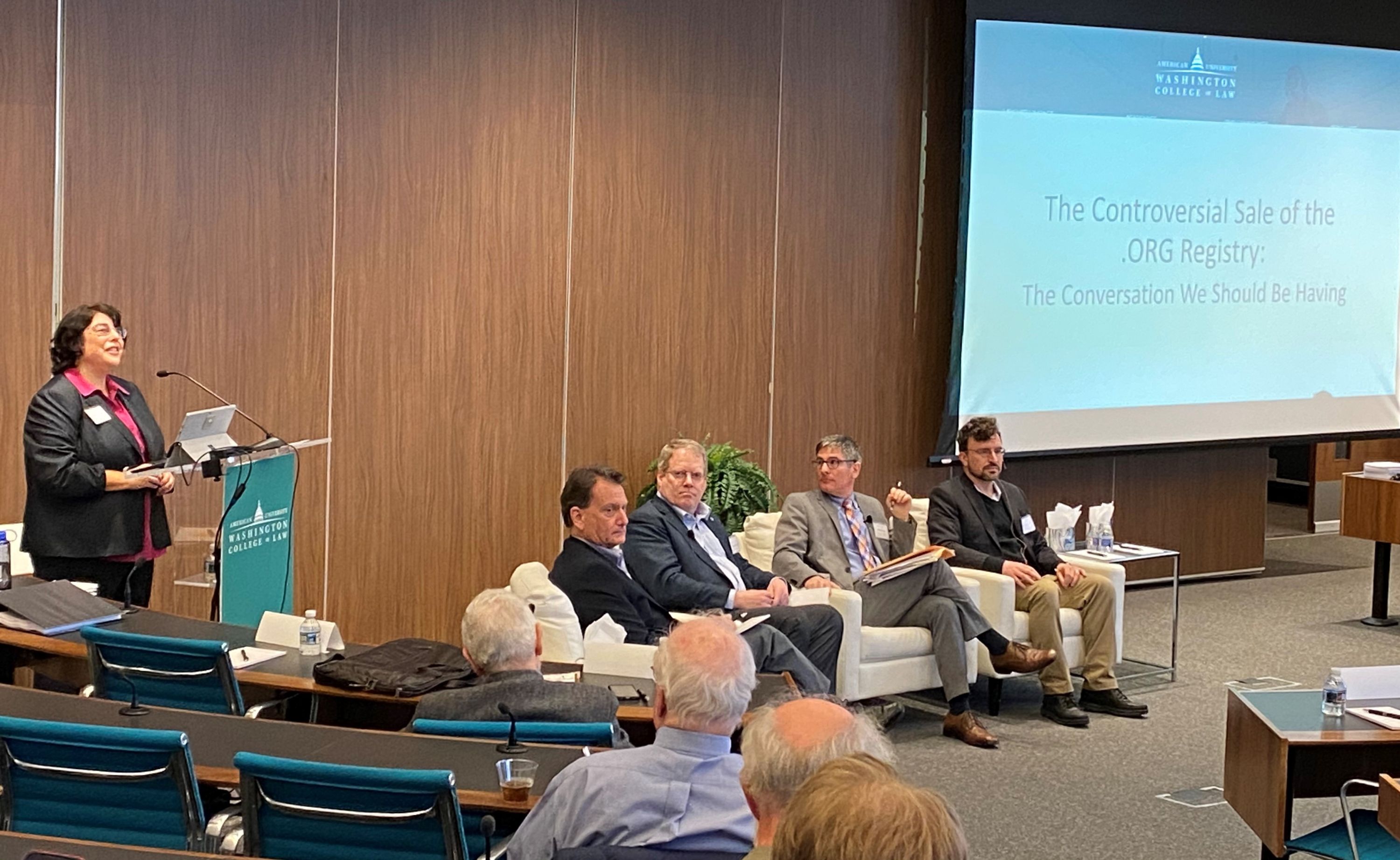General Agreement on Common Concerns at PIJIP’s 2/11 Discussion of the Sale of .ORG
Program on Information Justice and Intellectual Property

PIJIP was delighted to host a fascinating discussion about the proposed sale of the .ORG Registry at American University Washington College of Law (WCL) on Tuesday, 2/11. Our speakers were Andrew Sullivan, President and CEO of the Internet Society (ISOC), Mitch Stoltz, Senior Staff Attorney with the Electronic Frontier Foundation, Professor Benjamin Leff of WCL who teaches and researches the law of charitable and nonprofit organizations, and Marc Rotenberg, President and Executive Director of the Electronic Privacy Information Center and an early chair of the Public Interest Registry (PIR).
The domain name system is a foundational technology that powers important parts of the Internet, including websites and email. The .ORG top-level domain name is one of the original seven established in 1985. Over 10 million registrants, primarily non-profit entities and noncommercial speakers, have built their online brand identities using .ORG to stand in contrast to the for-profit entities that are found in the .COM and other newer top-level domains. Since 2003, .ORG has been managed and administered by a not- profit entity, the Public Interest Registry (PIR), which has the non-profit Internet Society as its only member. A private equity firm, Ethos Capital, has agreed with the Internet Society (ISOC) to acquire PIR for $1.135 billion and convert PIR into a for-profit entity to administer .ORG. Many civil society organizations oppose the transaction or seek changes to its terms.
Facilitator Kathryn Kleiman, IP Clinic and PIJIP, introduced three meanings for “.ORG”: as a registry of .ORG domain names, as a group of 10 million .ORG registrants (some holding their domain names for over two decades), and as a community of users who rely on .ORG organization websites to locate favorite charities, human rights projects, school postings, local religious services and political party information in an election year.
We learned that the charitable mission and purpose of PIR, since its founding 15 years ago, included both support of ISOC and protection/promotion of .ORG registrants and the larger .ORG community who rely on .ORG websites, services and speech.
After a robust discussion, general agreement emerged on a common set of concerns. Participants and many in the audience generally agreed that there should be enforceable commitments in the transaction to provide:
- Limitations on price changes. It is difficult for NGOs and small nonprofit and noncommercial organizations to switch to some other name – none has the same meaning, cache and trust.
- Clear and enforceable anti-censorship rules. As speakers discussed, .ORG registrants often design their noncommercial content to openly challenge corporate policies and government practices – making them targets for removal by challenges that fall short of due process.
- Alternatively, .ORG should be bound to content removal procedures that are developed with full and active participation of .ORG registrants, openly and transparently, with accountability that decisions reflect the agreement and concerns of this special group of registrants.
- Removal of Uniform Rapid Suspension system (URS) and Trademark Clearinghouse obligations (forms of trademark protection adopted for roll-out of “new generic top level domains” in 2012, but not adopted pursuant to ICANN’s multistakeholder, consensus model for legacy gTLDs (including .ORG)); no additional “rights protection mechanisms” for .ORG will be adopted unless they arise through ICANN’s multistakeholder, consensus process.
- Public accountability for all policies and practices regarding the removal of content, including public disclosure, notice of proposed changes, consultation with .ORG registrants, and the ability of the .ORG registrant community to veto any change.
- Continued sponsorship by PIR of a range of activities for .ORG registrants and the .ORG Community, e.g., schools of Internet governance around the world, and awards for outstanding .ORG websites that serve their communities well.
Thanks to the tremendous speakers, the engaged and active audience who joined the discussion, and all who watched online!
The following links provide additional materials from the AU WCL 2/11 discussion, about .ORG and PIR generally, and additional background of the parties involved in and concerns arising from the sale of .ORG:
- Slides of the AU WCL .ORG Discussion:
- https://en.wikipedia.org/wiki/.org
- https://thenew.org/org-people/about-pir/
- https://savedotorg.org/
- https://www.eff.org/press/releases/eff-icann-stop-org-domain-registry-sale-private-equity-firm
- https://www.internetsociety.org/news/press-releases/2019/ethos-capital-to-acquire-public-interest-registry-from-the-internet-society/